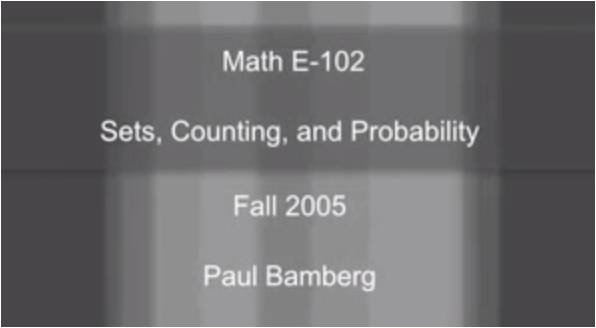Math E-102 - Sets, Counting, and Probability
Math E-102 - Sets, Counting, and Probability (Fall 2005, Harvard Extension School). Instructor: Professor Paul G. Bamberg. This online math course develops the mathematics needed to formulate and analyze probability models for idealized situations drawn from everyday life. Topics include elementary set theory, techniques for systematic counting, axioms for probability, conditional probability, discrete random variables, infinite geometric series, and random walks. Applications to card games like bridge and poker, to gambling, to sports, to election results, and to inference in fields like history and genealogy, national security, and theology. The emphasis is on careful application of basic principles rather than on memorizing and using formulas.
 |
Lecture 01 - Probability, Intuition, and Axioms
Probability by Symmetry; Probability by Experiment; Payoffs and Probability; Fair Price and Probability; Notation to Combine Sets; Venn Diagrams; Events and Sample Spaces; Event Spaces; Addition of Probabilities; Probability Functions; Inclusion-Exclusion Rule; Many Ways to Skin a Cat.
Lecture 02 - Probability by Counting and Inclusion-Exclusion
Review of the Basics; DeMorgan's Laws; Inclusion-Exclusion; Cups and Saucers; Cups and Saucers #2; Urns; Family Planning; Twenty-first-Century Sheherezade; Craps; Achilles Rolls of a 6.
Lecture 03 - Principles of Counting
Count A Cartesian Product; The Binomial Theorem; Counting Poker Hands; Counting Bridge Hands; The Munchkin Problem; Genoese Lottery; Counting Suit Patterns; Negative Binomial Theorem; Count by Inclusion-Exclusion.
Lecture 04 - Conditional Probability
St. Paul at Lystra; Conditional Four Aces; Conditional Probability; Independence of Events; Complimentary Events; The Bearded Man Problem; Lemons; Two Useful Theorems; Conditional Munchkins; Monty Hall Problem; Random Desserts.
Lecture 05 - Conditional Craps
Independence of 3 Events; Compound Experiments; Accidental Independence; Sudden Death; Sampling Paradox.
Lecture 06 - Lying Witnesses and Simpson's Paradox
Wisdom of Solomon; Eddington's Controversy; Affirmative Action; Simpson's Paradox.
Lecture 07 - Random Variables
Discrete Random Variables; Event Space for a DRV; Bridge and Poker; Binomial Distribution; Geometric Distribution; Negative Binomial Distribution; Exponential Function; Poisson Distribution; Distribution Function; Distribution Examples; Function of Random Var; First Computer Project.
Lecture 08 - Expectation I
Unconscious Statistician; Properties of Expectation; Binomial Expectation; Tail-Sum Theorem; Geometric Tail-Sum; Negative Binomial Expectation; Coupons Problem; Variance; Telescoping Series; Convergence.
Lecture 09 - Expectation II
Infinite Expectation; Royal Oak Lottery; Poisson as Limit; Conditional Random Var; Conditional Expectation; Runs of Heads and Tails; Two Wins Takes All.
Lecture 10 - Tartan Dice; Terminated Geometric; Coin Tossing
Tartan Dice; Terminated Geometric; World Series Pitchers; Negative Hypergeometric; Coin Tossing.
Lecture 11 - Gambling
Casino Night; Random Walk Examples; Random Walk Terminology; Gambler's Ruin; Ruin in Fair Casino; Time until Win or Ruin; A Fair Game; Walk as a Random Variable; Ballot Theorem; Hitting Time Theorem; Expected Lead Times.
Lecture 12 - Expected Lead Time; Bijections Between Paths
Another Bijection; Last Visit to Origin; First Visit to Final; First Visit to Max; First Return; Returning Just Once; Strange but True.
Lecture 13 - Variables
First Visit to Max; Sojourn Times; Independent Variables; Uncorrelated Variables: A Counterexample; Generating Function; Product of Gen Functions; A Simple Example; Gen Function for 2 Dice; Clever Loaded Dice; Well-Known Distributions.
Lecture 14 - Inequality
Basic Inequality; Markov's Inequality; Chebyshev's Inequality; Weak Law of Large Numbers; Weak Law, continued; Strong Law of Large Numbers.
| References |
| Sets, Counting, and Probability Instructor: Professor Paul G. Bamberg. Class Materials. This online math course develops the mathematics needed to formulate and analyze probability models for idealized situations drawn from everyday life. |